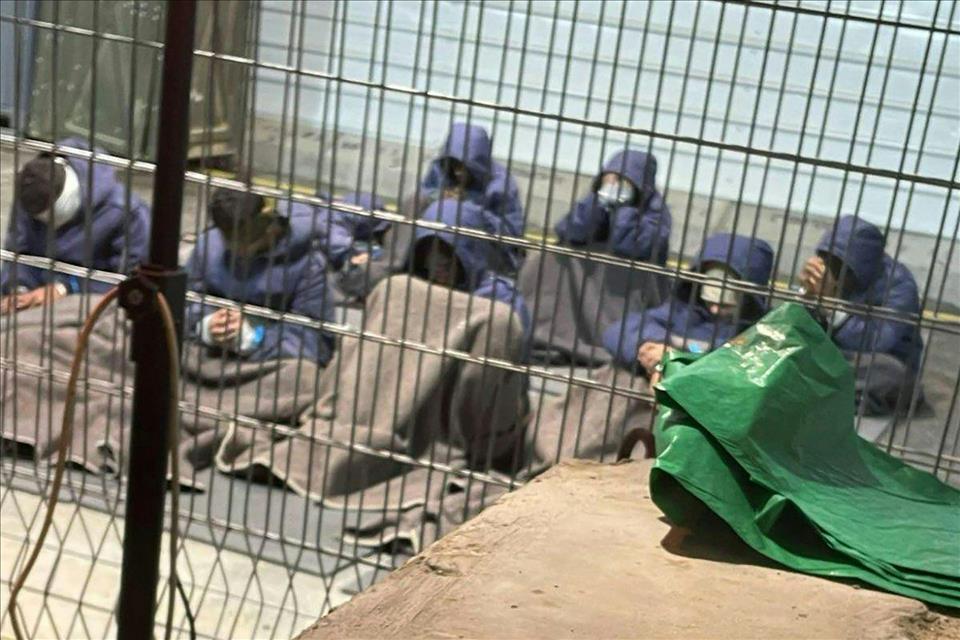
Arrest Of Top Whistleblower Shows Extent Of Israeli Impunity Over Torture Of Palestinian Detainees
It started with a complaint filed by a doctor who had served in the medical facility next to the Sde Teiman detention camp in the Negev desert in southern Israel. Professor Yoel Donchin reported that a detainee appeared to have been a victim of a severe assault. The detainee arrived at the hospital showing signs of beating and possible brutal sexual assault.
Following Donchin's report and a subsequent investigation, a group of reservists from the Israel Defense Forces (IDF) were arrested on suspicion of abusing the Palestinian. When Israeli military police arrived at Sde Teiman to detain the soldiers, protesters forced entry into the Sde Teiman camp in an attempt to stop the arrest. When that failed, rioters – including armed soldiers on active duty – attempted to break into the military police headquarters and free the arrested soldiers.
This drew attention to the fact that allegations of torture and abuse of Palestinian prisoners and detainees have become common in Israeli incarceration facilities since the Hamas attack on Israel on October 7 2023. Yet, despite ample evidence against Israeli soldiers, prison warders and interrogators from Israel's security services (Shabak), there have been few attempts to hold anyone accountable.
In some respects, this lack of accountability is consistent with what has long been Israel's approach regarding violence towards Palestinians. Despite being a country apparently bound by the rule of law, cases in which Palestinians have been mistreated, abused, tortured and killed have rarely been addressed by the Israeli legal authorities. Soldiers and Shabak interrogators enjoy a de-facto impunity for committing crimes against Palestinians, including torture.
This effective impunity exists despite Israel having robust systems to ensure prosecutions. For example, the Ministry of Justice has a dedicated unit to address complaints against Shabak interrogators pertaining to allegations of torture. Yet, out of more than 1,450 complaints filed against Shabak interrogators between 1992 and early 2023, criminal investigations have been opened in just three cases. None have led to indictments.
We argue that these mechanisms of accountability were never primarily motivated by concerns with the rule of law. Nor were they about holding members of Israel's security forces accountable for crimes committed against Palestinians. They were always mainly a facade, motivated, to a great extent, by an attempt to protect Israel and its security personnel from prosecutions in international courts.
The jurisdiction of international courts is limited by the principle of complementarity. This means that the International Criminal Court (ICC) can only intervene when complainants cannot get justice in domestic courts. By showing that it has an independent legal system to which Palestinians can turn, and which can potentially hold perpetrators accountable, Israel can protect its security personnel from charges by the ICC.

Knesset member Revital Gotliv and activists protesting over the arrest of Israeli soldiers over abuse allegations. Matan Golan/Sipa USA/Alamy Live News
Nevertheless, our research into the use of torture by Israel has found evidence to suggest that this system – weak as it was in terms of accountability – actually did restrain Israeli interrogators.
The restraining effects of these accountability mechanisms became even clearer when they all but ceased to function after October 7 2023. For example, a study published in September, which examined complaints lodged by Palestinians with Israeli non-governmental organisations, found“diverse forms of reported violence that could potentially constitute torture”. Ample testimonies suggest what Israeli human rights group B'Tselem called a“rushed transformation of more than a dozen Israeli prison facilities, military and civilian, into a network of camps dedicated to the abuse of inmates as a matter of policy”.
The loosening of the reins since October 2023 can be explained, to a large extent, by the Hamas attack itself. The viciousness of the attack was perceived by many in Israel as changing the rules. In the eyes of many Israelis, it legitimised a response which is unconstrained by domestic or international law.
A Palestinian doctor talks about the abuse he was subjected to while in Israeli custody.
But this process began prior to Hamas' attack. Israel's legal mechanisms of accountability had already been weakened on the eve of October of 2023. This is due, in large part, to the judicial overhaul which was launched by the current Israeli government in January of that year.
From the moment the Netanyahu government assumed power at the end of 2022, it has done all it could to dismantle the independence of the Israeli judicial system. Its targeting of the judiciary was driven, in no small part, by the wish to remove anything that could stand in the way of expanding settlements, exercising harsher violence against Palestinians and, ultimately, annexing the West Bank.
The targeting of this system has eroded its ability to withstand pressures. It has effectively left it unable to investigate war crimes and press charges against security personnel. The demise of this system played a central part in unleashing the unprecedented levels of Israeli violence against Palestinians witnessed over the past two years.
Finding a scapegoatIt's against this backdrop that the resignation and arrest of Tomer-Yerushalmi can be understood as part of the bigger story of the seminal change in Israel's approach towards accountability.
When word got out in July of last year that she was planning to press charges against those responsible for the assault on the detainee in Sde Teiman, the military lawyer was attacked by the government and its supporters. She was painted as a traitor by ministers and in the right-wing media. Regular demonstrations were held outside her home and, worse, she was assaulted by proponents of the accused soldiers on the streets. Security around her had to be tightened after she started receiving death threats.
Yifat Tomer-Yerushalmi admitted leaking video of prisoner being abused. Oren Ben Hakoon/Associated Press
Trying to protect herself and her team from these attacks, Tomer-Yerushalmi leaked CCTV footage of the assault in Sde Teiman to the press. In her resignation letter, she wrote that she authorised the leak in an attempt to counter the false propaganda directed against the military law enforcement authorities.
She told a meeting of the Knesset foreign affairs and defense committee that investigating allegations of abuse of this nature was a show of strength rather than of weakness. The independence of the military justice system was, she said,“essential to the state's arguments in international tribunals”. She added:“There are countries for which the question of whether they sell and supply us with munitions is [determined by] whether we investigate when we receive a complaint.”
She seems to believe that Israel's legal system must be seen to act when it encounters cases as severe as this. But in Israel after October 7 this appears no longer to be the case. As the response by Netanyahu and other ministers suggest, Israel is no longer interested in maintaining even this facade of accountability.
The leaked video prompted public outrage. But the government has managed to shift the focus away from the alleged atrocities the soldiers committed and onto the leaking of the footage. Netanyahu called this“perhaps the most severe propaganda attack against the State of Israel” in its history".
Read more: Israeli doctors reveal their conflicted stories of treating Palestinian prisoners held in notorious 'black site' Sde Teiman
The official allegations against Tomer-Yerushalmi include tempering with the committee set to investigate the link, and providing a false statement to Israel's High Court of Justice concerning the affair. But even before the video was leaked – and well before Tomer-Yerushalmi was revealed as the leaker – Netanyahu's far-right government colleagues were attacking the investigation itself.
Minister of national security Itamar Ben Gvir called it“shameful” and demanded“a full backing for our hero soldiers”. Finance minister Bezalel Smotrich called the abuse allegations“blood libels against the State of Israel” – a reference to antisemitic lies told about Jewish practices in medieval Europe.
It seems, then, that Tomer-Yerushalmi is being targeted not for the offences she is now investigated for. She is rather attacked for one of the very few cases in which she decided to act in accordance with her role.
The tribulations of the first woman to ever serve as the military's most senior lawyer must therefore be understood as part of a broader story. This is about the Netanyahu goverment's efforts to rid Israel of its mechanisms of accountability while also bringing the judiciary under executive control.
In the meantime, the victim of this gruesome assault is still suffering from its aftermath. His injuries have left him with several medical complications and permanently disabled. He was released back to Gaza in the last hostage deal. He was not asked to provide his testimony prior to his release.

Legal Disclaimer:
MENAFN provides the
information “as is” without warranty of any kind. We do not accept
any responsibility or liability for the accuracy, content, images,
videos, licenses, completeness, legality, or reliability of the information
contained in this article. If you have any complaints or copyright
issues related to this article, kindly contact the provider above.

















Comments
No comment